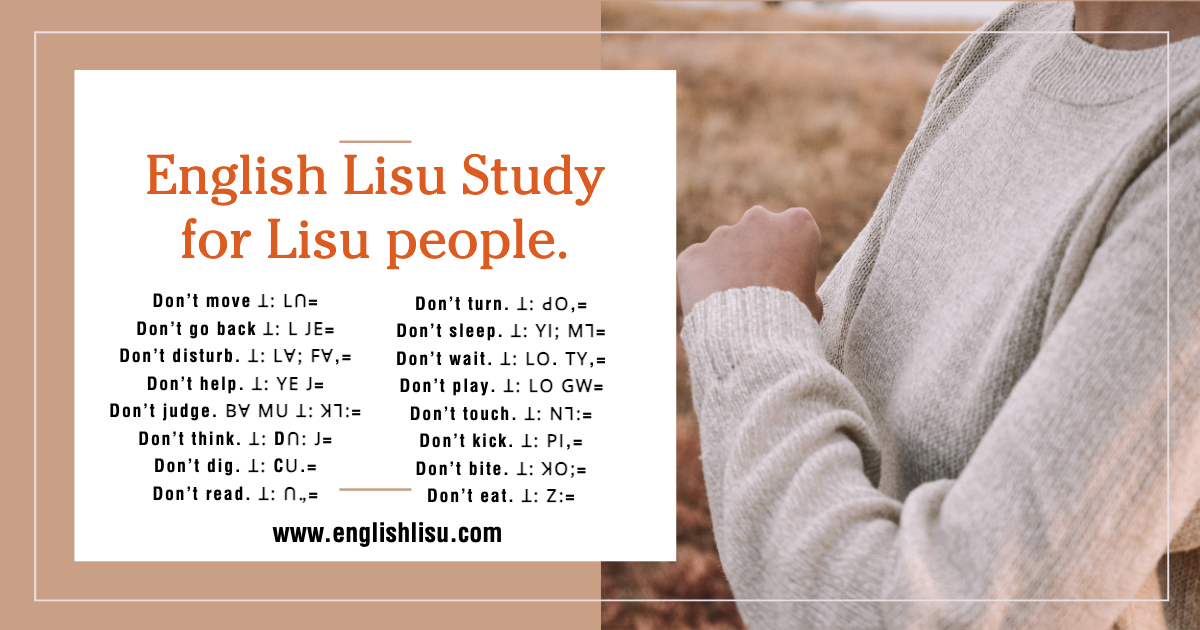English Lisu Study for Lisu people.
Introduction:
In today’s interconnected world, proficiency in English has become a valuable skill, opening doors to diverse opportunities and facilitating global communication. While mastering any language can be challenging, understanding the nuances of English grammar and sentence structure can prove especially daunting for non-native speakers. However, a groundbreaking study conducted on the English Lisu community has shed light on a remarkable approach to effectively communicate in English using short sentences.
The English Lisu Study, conducted by a team of linguists and language experts, delves into the unique language learning methods employed by the Lisu people, an ethnic group residing primarily in Southeast Asia. Known for their exceptional ability to express complex ideas using concise phrases, the English Lisu have captivated the attention of language enthusiasts and educators alike.
This study aims to unravel the secrets behind the Lisu people’s remarkable linguistic skills, focusing on their ability to communicate effectively in English with short sentences. By examining their language acquisition techniques, the research offers valuable insights and practical strategies that can be adapted and implemented by learners striving to enhance their English proficiency.
Throughout this introduction, we will explore the significance of the English Lisu Study, highlighting the implications it holds for language learners worldwide. By understanding the underlying principles of their approach, individuals seeking to improve their English language skills can gain valuable insights into constructing concise and impactful sentences.
Short Sentences by English Lisu Study:
Don’t be afraid. ꓕꓽ ꓙꓳꓻ=
Don’t talk like that ꓳ ꓡꓲ ꓕꓽ ꓕꓱ=
Don’t move ꓕꓽ ꓡꓵ=
Don’t go back ꓕꓽ ꓡ ꓙꓰ=
Don’t disturb. ꓕꓽ ꓡꓯꓼ ꓝꓯ,=
Don’t help. ꓕꓽ ꓬꓰ ꓙ=
Don’t judge. ꓐꓯ ꓟꓴ ꓕꓽ ꓘꓶꓽ=
Don’t think. ꓕꓽ Dꓵꓽ ꓙ=
Don’t dig. ꓕꓽ Cꓴ.=
Don’t read. ꓕꓽ ꓵꓻ=
Don’t turn. ꓕꓽ ꓒꓳ,=
Don’t sleep. ꓕꓽ ꓬꓲꓼ ꓟꓶ=
Don’t wait. ꓕꓽ ꓡꓳ. ꓔꓬ,=
Don’t play. ꓕꓽ ꓡꓳ ꓖꓪ=
Don’t touch. ꓕꓽ ꓠꓶꓽ=
Don’t kick. ꓕꓽ ꓑꓲ,=
Don’t bite. ꓕꓽ ꓘꓳꓼ=
Don’t eat. ꓕꓽ ꓜꓽ=
Don’t divide. ꓕꓽ ꓒꓯꓽ=
Don’t share. ꓕꓽ ꓐꓱ ꓡꓯ ꓘꓳ=
Don’t keep. ꓕꓽ ꓛꓻ=
Don’t take. ꓕꓽ ꓔꓯ, ꓙꓰ=
Don’t click. ꓕꓽ ꓥꓰ.=
Don’t write it. ꓖꓳ ꓟ ꓕꓽ ꓐꓳ=
Don’t write. ꓕꓽ ꓐꓳ=
Don’t write here. ꓕꓱ ꓗꓪ ꓕꓽ ꓐꓳ=

Moreover, this study not only benefits language learners but also serves as a testament to the rich diversity of linguistic practices around the globe. Through the exploration of the Lisu people’s language capabilities, we gain a deeper appreciation for the multitude of ways in which human beings can convey their thoughts and ideas.
As we delve into the English Lisu Study and its findings, we invite readers to embark on a journey that unveils the remarkable secrets of speaking English with short sentences. Whether you are a language enthusiast, educator, or someone striving to refine your English language skills, this study promises to offer valuable perspectives and transformative strategies that can pave the way towards greater fluency and effective communication.
Long Sentences by English Lisu Study:
Don’t let him wait ꓬꓲ ꓔꓯ ꓕꓽ ꓡꓳ. ꓔꓬ, ꓝꓲ=
Don’t write your name. ꓠꓴ ꓟꓬꓱꓺ ꓕꓽ ꓐꓳ=
Don’t write her name. ꓬꓲ ꓟꓬꓱ ꓕꓽ ꓐꓳ=
Don’t write my name. ꓥꓪ ꓟꓬꓱꓺ ꓕꓽ ꓐꓳ=
Don’t write his name. ꓬꓲ ꓟꓬꓱꓺ ꓕꓽ ꓐꓳ=
Don’t write their names. ꓬꓲ ꓪ ꓟꓬꓱꓺ ꓕꓽ ꓐꓳ=
Don’t come with me. ꓥꓪ ꓐꓰ ꓕꓲ ꓪꓸꓼ ꓕꓽ ꓡꓯ=
Don’t come with us. ꓥꓪ ꓠꓴꓽ ꓐꓰ ꓕꓲ ꓪꓸꓼ ꓕꓽ ꓡꓯ=
Don’t come with him. ꓬꓲ ꓐꓰ ꓕꓲ ꓪꓸꓼ ꓕꓽ ꓡꓯ=
Don’t come with them. ꓬꓲ ꓪ ꓐꓰ ꓕꓲ ꓪꓸꓼ ꓕꓽ ꓡꓯ=
Don’t come with her. ꓟꓶꓼ/ ꓬꓲ ꓐꓰ ꓕꓲ ꓪꓸꓼ ꓕꓽ ꓡꓯ=
Don’t come with friend. ꓛꓳꓽ ꓒꓯ, ꓐꓰ ꓕꓲ ꓪꓸꓼ ꓕꓽ ꓡꓯ=
Don’t come with father. ꓮ ꓐ ꓐꓰ ꓕꓲ ꓪꓸꓼ ꓕꓽ ꓡꓯ=
Don’t come with mother. ꓮ ꓟ ꓐꓰ ꓕꓲ ꓪꓸꓼ ꓕꓽ ꓡꓯ=
Don’t come with brother. ꓠꓬꓲ ꓤ ꓐꓰ ꓕꓲ ꓪꓸꓼ ꓕꓽ ꓡꓯ=
Don’t come with sister. ꓠꓬꓲ ꓟꓻ ꓐꓰ ꓕꓲ ꓪꓸꓼ ꓕꓽ ꓡꓯ=
Don’t come with teacher. ꓟ. ꓢꓴ ꓐꓰ ꓕꓲ ꓪꓸꓼ ꓕꓽ ꓡꓯ=
Don’t come with leader. ꓧꓳꓽ ꓢꓴ ꓐꓰ ꓕꓲ ꓪꓸꓼ ꓕꓽ ꓡꓯ=
Don’t come with your friend. ꓠꓴ ꓛꓳꓽ ꓒꓯ, ꓐꓰ ꓕꓲ ꓪꓸꓼ ꓕꓽ ꓡꓯ=
Don’t come with your father. ꓠꓴ ꓮ ꓐ ꓐꓰ ꓕꓲ ꓪꓸꓼ ꓕꓽ ꓡꓯ=
Don’t come with your mother. ꓠꓴ ꓮ ꓟ ꓐꓰ ꓕꓲ ꓪꓸꓼ ꓕꓽ ꓡꓯ=
Don’t come with your brother. NU ꓠꓬꓲ ꓤ ꓐꓰ ꓕꓲ ꓪꓸꓼ ꓕꓽ ꓡꓯ=
Don’t come with your sister. NU ꓠꓬꓲ ꓟꓻ ꓐꓰ ꓕꓲ ꓪꓸꓼ ꓕꓽ ꓡꓯ=
Don’t come with your teacher. ꓠꓴ ꓔꓯ ꓟ. ꓢꓴ ꓐꓰ ꓕꓲ ꓪꓸꓼ ꓕꓽ ꓡꓯ=
Don’t come with your leader. ꓠꓴ ꓔꓯ ꓧꓳꓽ ꓢꓴ ꓐꓰ ꓕꓲ ꓪꓸꓼ ꓕꓽ ꓡꓯ=
Don’t come with your son. ꓠꓴ ꓤꓽ ꓐꓰ ꓕꓲ ꓪꓸꓼ ꓕꓽ ꓡꓯ=
Don’t come with your daughter. ꓠꓴ ꓤ ꓟꓶꓼ ꓐꓰ ꓕꓲ ꓪꓸꓼ ꓕꓽ ꓡꓯ=
Don’t come with your friends. ꓠꓴ ꓛꓳ ꓒꓯ, ꓐꓴ ꓐꓰ ꓕꓲ ꓪꓸꓼ ꓕꓽ ꓡꓯ=
Don’t come with your husband. ꓠꓴ ꓦꓲꓻ ꓢꓲ ꓒꓽ ꓐꓰ ꓕꓲ ꓪꓸꓼ ꓕꓽ ꓡꓯ=
Don’t come with your wife. ꓠꓴ ꓦꓲꓻ ꓢꓲ ꓟꓻ ꓐꓰ ꓕꓲ ꓪꓸꓼ ꓕꓽ ꓡꓯ=
Don’t write my father’s name. ꓥꓪ ꓮ ꓐ ꓟꓬꓱ ꓕꓽ ꓐꓳ=
Don’t write that question. ꓠ ꓠꓬꓲ ꓘꓶꓽ ꓖꓳ ꓟ ꓕꓽ ꓐꓳ=
Don’t write your father’s name. ꓠꓴ ꓮ ꓐ ꓟꓬꓱꓺ ꓕꓽ ꓐꓳ=
Don’t write your friend’s name. ꓠꓴ ꓗꓪ ꓛꓳꓽ ꓟꓬꓱ ꓕꓽ ꓐꓳ=
Don’t write your mother’s name. ꓠꓴ ꓟ, ꓟ ꓟꓬꓱꓺ ꓕꓽ ꓐꓳ=
Don’t write your guardian’s name. ꓠꓴ ꓔꓯ ꓡꓳ. ꓙ ꓢꓴ ꓟꓬꓱ ꓕꓽ ꓐꓳ=
Study more:
